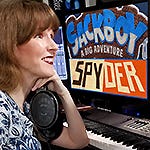
Featured Blog | This community-written post highlights the best of what the game industry has to offer. Read more like it on the Game Developer Blogs or learn how to Submit Your Own Blog Post
Narrative in trailers, cutscenes and cinematics (for the game music composer)
Emphasizing narrative using game music - 4th in an article series on music for trailers, cutscenes, & cinematics, by composer Winifred Phillips.

By Winifred Phillips | Contact | Follow
Hey, everybody! I’m video game composer Winifred Phillips, and I’m happy to welcome you back to the last installment of our four-part discussion of “scoring-to-picture” techniques within video games. In these articles we’ve considered how cutscenes, trailers, and cinematics can benefit from specific musical strategies. As game composers, our jobs involve lots of complex music systems requiring expert knowledge of dynamic composition techniques. However, we can still benefit from an examination of the goals that music can achieve during linear presentations within a game. Such goals may include:
Characterization
Information
Identity
Narrative
Earlier in this series of articles, we’ve discussed the ways in which music can support believable and moving characterization. We considered the ability of a musical score to emphasize details and enhance comprehension of information. We’ve also considered how a game’s intrinsic identity can be reinforced using thoughtful choices of musical style, particularly in the case of custom music for game trailers. So now let’s move on to the last item on our list, and the one most closely associated with linear music composition:
Narrative
In my book, A Composer’s Guide to Game Music, I considered the work of one of the top film studies researchers, Claudia Gorbman, who wrote, “The moment we recognize to what degree film music shapes our perception of a narrative, we can no longer consider it incidental or ‘innocent’.” Broadening out that sentiment to encompass narrative in games, I considered what that might mean for our work as game composers:

“If we accept that music has the power to deliver storytelling messages, then our responsibilities as game composers must broaden to include the interpretation and enhancement of plot. This would involve an understanding of what makes a story compelling and enjoyable, and an ability to recognize the strongest aspects of a game’s story so that we can attempt to heighten the player’s appreciation of those elements. It is useful for a composer for any type of storytelling media (film, television, games) to study dramatic writing at some point. We don’t need to become excellent writers but, by learning about the craft, we can better understand how the plot functions within the larger framework of the gameplay experience. Armed with this knowledge, we’ll have a better chance of recognizing when a particular plot point needs to be musically highlighted or when a set of character actions needs clarification by way of some strategic musical emphasis.” (Chapter 3, pg 50)
Returning to our discussion of linear visual sequences in games, let’s consider how storytelling impacts our work in these circumstances. Cutscenes and cinematics are often called upon to deliver narrative sequences. Trailers can also be storytelling devices, but this occurs with less frequency. Because a trailer is by nature a self-contained presentation, its narrative would need a satisfying ending. However, most trailers are designed to leave viewers wanting more, and so they typically tease the viewer with a promise of story, without revealing too much. Music is unable to structure itself around a story that is fragmentary rather than whole, because the logical rise and fall of a narrative musical structure would become choppy and jarring in those circumstances. With that in mind, music for trailers often focuses on a game’s overall identity or the nature of its characters. However, there are a few circumstances in which a trailer might present a complete story. Let’s take a look at an example.

As an entry in the popular Sims franchise, the SimAnimals video game focused on awesome interactions with charming wilderness creatures. Developed by the Sims Studio at Electronic Arts, SimAnimals is a life simulation game that encourages players to nurture the wildlife, develop relationships with various animals, and improve their habitats. The game does not present any kind of narrative, but its trailer does. In the SimAnimals trailer, Electronic Arts presents the life and times of a baby bear, his budding friendship with a perky squirrel, and the chaos ensuing when that squirrel steals a fox’s lunch. The story is told using rapid-fire vignettes that carry the narrative along until the baby bear is finally rescued by the player and returned to his parents. The trailer communicates the idea that players can meet and interact with adorable animals and help them out of tricky situations.
As a compact vehicle for storytelling, the trailer needed me to compose a vividly evocative musical score that would hit the action precisely and make the narrative crystal clear for viewers. Serving as the composer for both the SimAnimals game and its official trailer, I knew that I’d have to create a musical experience that was completely unique to the trailer, but reflected the spirit of the game. My music would have to establish a tranquil beginning, leading to a comically whimsical midpoint, segueing into an anxiously intense latter half, and finally returning to a triumphant end (with the SimAnimals theme melody strongly stated). This would allow my music to tell a complete story in parallel with the visual content. Let’s check that out:
The trailer for SimAnimals is an example of a strictly linear narrative in which all the elements of a complete story are compressed into 60 seconds. For a video like this to be effective, the music has to step forward and help the player follow the plot. Let’s take a look at another example – this time the music that I composed for the introductory cinematic to the Spore Hero video game.

Spore Hero is a game in Will Wright’s famous Spore franchise. The original Spore PC game followed the progress of various new species as they developed from single-celled organisms into great space-faring civilizations. As an open-ended life simulation game with a colorfully-imaginative visual style, Spore offered no story other than whatever the players themselves projected onto their budding creations.
Spore Hero, on the other hand, was an entirely story-driven experience. Developed by Electronic Arts, this whimsical console game traced the evolution of two interstellar creatures who fell to earth as eggs embedded in giant crystalline meteors. Assuming the roles of hero and villain, they fought over the fate of the world on which they had landed and hatched. All the while, the transformational powers of the meteors wrought havoc with the world’s native inhabitants. Gameplay in Spore Hero was driven by story imperatives, as the hero gained helpful allies and the best tools available to defeat the evil nemesis. This narrative-driven structure was never more evident than in the game’s opening cinematic, during which the origin story of the hero and villain are briskly told.
Unlike the SimAnimals trailer, the storytelling in the Spore Hero opening cinematic has a montage-like quality, as the action shifts rapidly from one location to another. Because of this, I knew that the music I composed for this cinematic would need to change in a similar fashion. I structured the music so that it moved from a broadly epic nature at the beginning, to a more primitive and whimsical style as the planet’s inhabitants got involved in the action. I also took special care to reinforce movement, lending visceral weight to the falling meteors and fanciful charm to the eccentric characters. Finally, I introduced a simple five-note motif at the beginning of the cinematic and then repeated it several times, making it more impactful when it returned as the game’s main theme during menus.
Conclusion
Over the course of these articles, we’ve taken a look at the ways in which the linear approach complements our work as game composers, specifically in regards to trailers, cutscenes, and cinematics. Linear music can be a potent way to add impact to characterization, impart information efficiently, instill a sense of identity into the game project, and propel narrative in a clear and effective way. While dynamic music techniques will always be at the center of our work as game composers, we shouldn’t forget how useful linear composition can be in the right circumstances. Until next time, thanks for reading!

Winifred Phillips is a BAFTA-nominated video game composer whose latest project is the Jurassic World Primal Ops video game (the official game of the blockbuster movie Jurassic World Dominion). Other recent releases include the hit PlayStation 5 launch title Sackboy: A Big Adventure (soundtrack album now available). Popular music from Phillips’ award-winning Assassin’s Creed Liberation score was featured in the performance repertoire of the Assassin’s Creed Symphony World Tour, which made its Paris debut in 2019 with an 80-piece orchestra and choir. As an accomplished video game composer, Phillips is best known for composing music for games in many of the most famous and popular franchises in gaming: the list includes Assassin’s Creed, God of War, Total War, The Sims, and Sackboy / LittleBigPlanet. Phillips’ has received numerous awards, including an Interactive Achievement Award / D.I.C.E. Award from the Academy of Interactive Arts and Sciences, six Game Audio Network Guild Awards (including Music of the Year), and four Hollywood Music in Media Awards. She is the author of the award-winning bestseller A COMPOSER’S GUIDE TO GAME MUSIC, published by the MIT Press. As one of the foremost authorities on music for interactive entertainment, Winifred Phillips has given lectures at the Library of Congress in Washington DC, the Society of Composers and Lyricists, the Game Developers Conference, the Audio Engineering Society, and many more. Phillips’ enthusiastic fans showered her with questions during a Reddit Ask-Me-Anything session that went viral, hit the Reddit front page, received 14.9 thousand upvotes, and became one of the most popular gaming AMAs ever hosted on Reddit. An interview with her has been published as a part of the Routledge text, Women’s Music for the Screen: Diverse Narratives in Sound, which collects the viewpoints of the most esteemed female composers in film, television, and games. Follow her on Twitter, Facebook, and Instagram.
Read more about:
Featured BlogsAbout the Author(s)
You May Also Like







.jpeg?width=700&auto=webp&quality=80&disable=upscale)








